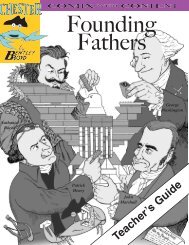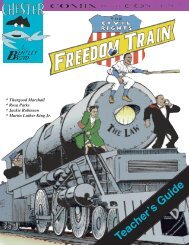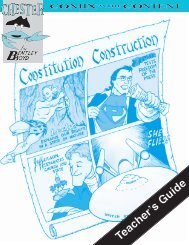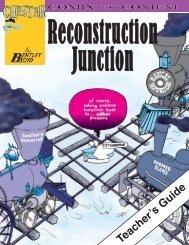Teacher's Guide - Chester Comix
Teacher's Guide - Chester Comix
Teacher's Guide - Chester Comix
You also want an ePaper? Increase the reach of your titles
YUMPU automatically turns print PDFs into web optimized ePapers that Google loves.
SKILLS<br />
Interjections Main Idea<br />
Predicting Outcomes Noting Details<br />
Story Vocabulary<br />
1. INTRODUCE THE STORY<br />
READING STRATEGY SUGGESTIONS<br />
Read the title and describe the cover.<br />
Have a “cover conversation.” Point to the<br />
parts that repeat from book to book. Note<br />
things that are different about this book.<br />
What is happening<br />
SAY: “This is a comic book<br />
narrated by <strong>Chester</strong> the Crab. It is about<br />
the arguments that led to the American<br />
Revolution. Can you name some<br />
people in that fight for freedom”<br />
Take a picture walk through the first<br />
story in this comic, “The French & Indian<br />
War,” to see what <strong>Chester</strong> is learning.<br />
Point to the parts of a comic: title,<br />
timeline, panels, word balloons, and<br />
characters.<br />
2. INTRODUCE THE STORY VOCABULARY<br />
Write the story vocabulary and content phrases (presented below) on a classroom<br />
board. Use color as a way to build memory by writing the proper nouns in a different<br />
color. (These words and their definitions can also be written on separate cards and<br />
placed face down on a table for students to play a matching or memory game.)<br />
Tell students on which page to find each word. Have students read the sentence that<br />
has a given vocabulary word and use context and picture clues to form a definition.<br />
VOCABULARY DEFINITIONS (in order of appearance)<br />
George Washington (p. 2) – leader of colonist army during American Revolution<br />
Appalachian Mountains (p. 2) – mountain ridge in eastern half of United States<br />
volunteer (p. 3) – one who chooses to participate in a group or activity<br />
colonists (p. 3) – someone who settles a distant land for the land’s controlling nation<br />
William Pitt (p. 4) – British prime minister during French and Indian War<br />
treaty (p. 6) – agreement between nations or groups, often used to end a war<br />
King George III (p. 6) – head of England’s monarchy government in American Revolution<br />
Proclamation Line of 1763 (p. 6) – western boundary for British colonies in North<br />
America set by King George III; colonists were not to cross the Appalachian ridge<br />
3






